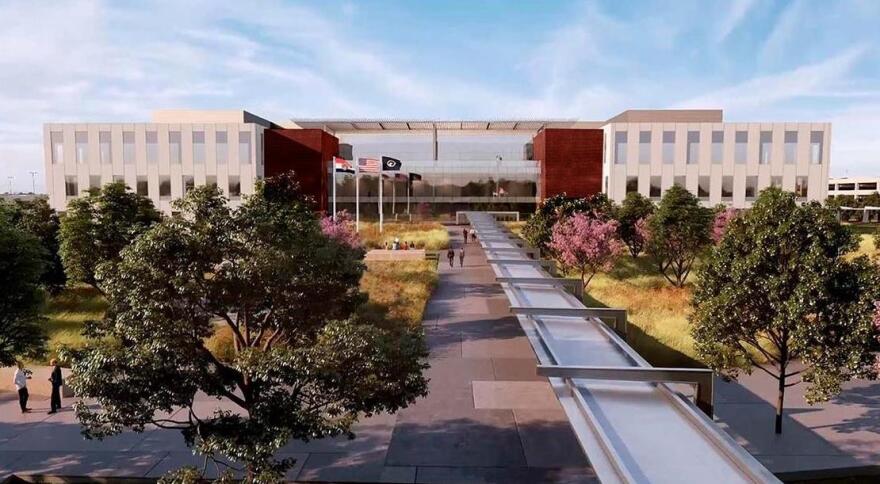This story was updated at 1 p.m. with comments from local leaders
Local and state leaders on Tuesday heralded construction of the National Geospatial-Intelligence Agency's new western headquarters as the linchpin for a neighborhood turnaround in north St. Louis.
The $1.75 billion campus — dubbed Next NGA West — will go up on the corner of Jefferson and Cass avenues in the St. Louis Place neighborhood. The NGA is a federal agency under the Department of Defense that gathers geospatial intelligence.
Construction on the 97-acre site will include a more than 700,000-square-foot office building, parking garages, a visitor center and security checkpoints.
Major construction will start in the spring, and it’s expected to wrap up in 2023. The project is considered the largest federal investment in St. Louis history. The complex will replace the NGA's current facility in south St. Louis, between the Anheuser-Busch brewery and the Mississippi River.
A groundbreaking ceremony for the new campus included Gov. Mike Parson; U.S. Sen. Roy Blunt, R-Mo.; U.S. Rep. Lacy Clay, D-University City; and U.S. Rep. Adam Schiff, D-Calif., chairman of the House Intelligence Committee, as well as numerous other officials. The celebration came after more than three years of planning.

“This project symbolizes a beacon of hope,” Clay said.
“The city of St. Louis must now partner with this community to bring it back by advocating and pushing for complementary development and vital public services it badly needs and deserves.”
Clay said that means affordable housing, health care facilities, infrastructure improvements and enhanced policing.
On a larger scale, Schiff said the new campus will show off how the intelligence community is opening up.
“As the world continues to change and the threats to our nation’s security become more complex, we must realize that collaboration across the [intelligence community] between government and the private sector, and with academia, is critical to ensuring the nation’s security.”
During a community outreach event Monday night, St. Louis Mayor Lyda Krewson said the new NGA campus is a catalyst for the growing geospatial industry.
“We’re already seeing more and more businesses in this arena,” she said. “Geospatial is in everything, not just our phones. It’s a part of everything today, so it’s a real boon.”

But outside the event, a group of about a dozen activists held signs and chanted phrases like, “No way NGA.”
During a press conference, members of several groups argued the development must be stopped because it won’t be in the best interest of longtime residents like Gustavo Rendon.
He said he was forced to leave his neighborhood of 20 years through eminent domain to make way for the new NGA campus. He said he’s been protesting most Sundays since then.
“Please, for the good of your spirit, of your conscience, NGA, go someplace else,” Rendon said.
Inside, other residents, including Carmen Gamble, expressed excitement for new development.
The lifelong resident of College Hill, a north side neighborhood a few miles away, said she hopes the NGA will bring more stores, restaurants and green spaces to north St. Louis.
“It speaks volumes to the potential for this particular area, and it definitely brings a significant value for what this area can actually become,” Gamble said.
Over the next few years, the project will also bring in construction jobs.
During peak construction in 2022, the U.S. Army Corps of Engineers anticipates the project will employ more than 1,100 workers a day.
The group’s Kansas City District is overseeing the construction and design work of McCarthy HITT — a combined venture between McCarthy Building companies and HITT Contracting. The two won a more than $700 million contract for the work earlier this year.
Parson said the new campus ties into his push for better-paying jobs in Missouri.
“We are committed to do all that we can do to skill up our workforce, support the geospatial industry and help the NGA fulfill its mission in its next 100 years in our state.”
The NGA currently employs more than 3,000 people who are expected to move to the new campus in 2025.
The new campus is also considered the anchor to a growing geospatial industry in St. Louis.

Vice Admiral Robert Sharp, NGA director, said the new facility gives the agency a fresh start. He said the space is designed with more declassified areas for collaboration with academics and businesspeople.
“The tools that we use can be used for city planning, for improving security, for agriculture reasons,” he said. “And if we can get smarter doing our business and also benefit someone who’s doing something else to improve society, that’s what we want to do.”
The geospatial industry currently supports more than 26,000 jobs across the St. Louis region and has had a total economic impact of nearly $5 billion, according to the St. Louis Development Corporation.
Follow Corinne on Twitter: @corinnesusan
Send questions and comments about this story to feedback@stlpublicradio.org



